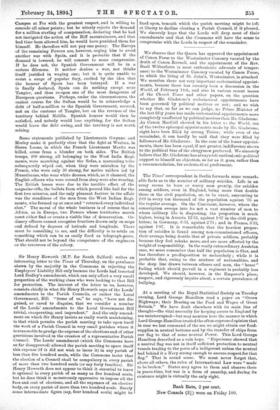Sir Henry Howorth (M.P. for South Salford) writes an interesting
letter to the Times of Thursday, on the petulance shown by the majority in the Commons in rejecting the Employers' Liability Bill only because the Lords had inserted Lord Dudley's amendment, which can only affect a very small proportion of the working class who were looking to that Bill for protection. The interest of the letter to us, however, consists chiefly in what Sir Henry Howorth says of the Lords' amendments to the Parish Councils, or rather the Local Government, Bill. "Some of us," he says, "have not dis- guised, or cared to disguise, that we consider a number of the Lords' amendments to the Local Government Bill trivial, exasperating, and imprudent." And the only amend- ment on which Sir Henry insists as really worth maintaining, is that which permits the parish meeting to take upon itself the work of a Parish Council in very small parishes where it is reasonable to grudge the expense of the elections and of other provisions involved in the creation of a representative Parish Council. The Lords' amendment (which the Commons have eo far disapproved) allowed the parish meeting to spare itself this expense (if it did not wish to incur it) in any parish of less than five hundred souls, while the Commons insist that the election of a Council shall be compulsory in every parish of more than two hundred souls (or say forty families). Sir Henry Howorth does not appear to think it essential to leave it optional in every parish of as many as five hundred souls, but he does think it monstrously oppressive to impose all the fuss and cost of elections, and all the expenses of an elective body, on every parish of more than two hundred souls. Surely some intermediate figure (say, four hundred souls) might be
fixed upon, beneath which the parish meeting might be left at liberty to decline electing a Parish Council, if it pleased. We sincerely hope that the Lords will drop most of their amendments and that the Commons will have the sense to compromise with the Lords in respect of the remainder.


































 Previous page
Previous page